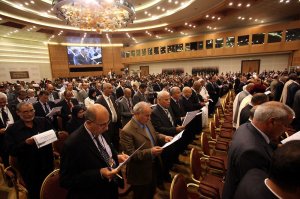
A year ago, just after the election this body was supposed to implement ambitious changes: to form new government, to adopt constitution, to draft a new legal framework, to hold the parliamentary and presidential elections. All this was to be done despite the total confusion that governs the Libyan society today, despite the intervention of NATO into the internal affairs of the country, despite the total dominance of numerous armed units that came into power after the complete dismantling of the old state’s structures.
Over the past year the country has acquired a number of formal democratic features due to the National Congress such as political parties, independent mass media, the right to express one’s opinions freely, say at the demonstrations, etc. But these are the traits taken from some alien political superstructure, they don’t belong here. The country is overrun with outbursts of violence produced by the rivalry of the former rebel militia groups that are out of control of the Government.
Thus, more than 50 people were shot and many more were injured this June in numerous armed clashes in Tripoli, Benghazi, Sirte and all across the South of the country. Meanwhile the amred groups formally attributed to the Ministry of Defence and the troops of the Ministry of Internal Affairs confronted each other in the capital.
Due to these occurrences a military court session in Central Tripoli failed to consider an appeal to the case submitted by the detained citizens of Russia, Ukraine and Belarus. They were condemned by the authorities for allegedly aid to the Qaddafi regime during the war. The accused couldn’t be delivered to the courtroom, so the hearing was postponed.
These disturbances caused the Libyan elite to shake. In June, the Chief of the General staff has resigned and the Minister of Defense was dismissed. The latter by the way was the third politic to acquire the duties of the head of the military since October, 2011. The same fate awaited the Home Secretary.
In these circumstances, the first anniversary of congressional elections has become an occasion for swordplay between the rival factions and parties. The anniversary coincided with a demonstration Tripoli residents, who demanded the timely implementation of the decisions adopted by Congress on the demilitarization of the city and the disband of all the legal and illegal militia forces.
The National Coalition of forces (NCF), which has the most deputies on the party list, has decided to temporary suspend its participation in the day-to-day work of the Congress. The NCF, which is considered the most liberal party in Libya, castigates Parliament for having deviated from its primary objectives, since it’s sinking in less pressing matters. It failed miserably to prepare a draft of a new Constitution, or even to assemble a Commission on its development. Coalition members believe that Parliament is not up to the task of putting legitimacy in the post- Qaddafi Libya.
Another party, the “Justice and Construction Party”(JCP)- the political wing of the Muslim Brotherhood in Libya, going second to NCF by the number of seats in party lists, said that its representatives in Parliament and Government will act “individually and independently”, distancing themselves from the party line. The JCP decision is motivated by desire to preserve “stability” in Parliament, to defuse atmosphere of irritation accumulated on the street. Since it is common belief in Libya that all parties are supported by the armed groups, the calls can be heard today in Libya for an early dissolution of the interim Parliament.
Some commentators interpret the steps of the largest rivalry parties in Parliament to be a reactions to the emergence of two new trends in Libya is “Al-tamarrud” (rebellion) and “Al-rafd” (denial), following the example of Egypt. Are they influential, it is not yet clear, but they claim to have thousands of followers on their facebook accounts.1
It is clear that the actions of the two parties have the overall thrust to dissociate themselves from liability for the failures of the Government, especially of the military forces, since they put them in a delicate position in the eyes of the protestants that reside to the concrete actions against them.
Today, on its second year of existence, the National Congress, with a recently removed speaker M.Magarif, which was replaced by N.Abu Sahmain, with no charesmatic figures whatsoever is now essentially a slice of traditional Libyan society. In this society which has not yet completed the process of consolidation as a single nation, in which a 85% of residents have tribal roots, tribal rivalries and particularistic moods triumph. In such circumstances, it is almost impossible for Parliament, which itself reflects a very heterogeneous conglomerate of forces, to unite and rise as an arbitrator over his own members. No wonder it has been filibustered and attacked at various times by militia groups from different regions of the country.
So, the Libyan Parliamentarization should take time which, of course, is running out quickly now.
Yuri Zinin, senior researcher at MGIMO, exclusively for the online magazine “New Eastern Outlook”
